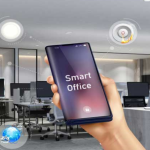
In today’s digital age, the concept of privacy has evolved dramatically. As we increasingly rely on technology in our daily lives, our need for secure private spaces becomes more critical than ever. This blog delves into the fascinating realm of “Tech-Enhanced Privacy” and explores how it’s shaping the future of private rooms.
The Evolution of Private Rooms
Private rooms have been a fundamental aspect of human civilization, offering sanctuary and seclusion from the outside world. However, the definition of privacy has evolved significantly in the digital era. With the advent of smart devices and the Internet of Things (IoT), our private spaces are now more interconnected than ever.
The Traditional Notion of Privacy
Traditionally, private rooms were physical spaces where we could have confidential conversations and engage in personal activities without the fear of intrusion. These rooms were defined by their physical boundaries, walls, and doors.
The Digital Transformation
In the digital age, private rooms have transcended their physical boundaries. Our smartphones, laptops, and smart home devices have become extensions of our private spaces. The virtual world has blurred the lines between physical and digital privacy.
Privacy Concerns in the Digital Era
As technology continues to infiltrate our private spaces, concerns regarding privacy and security have heightened. It’s essential to understand these concerns to appreciate the significance of tech-enhanced privacy.
Data Breaches and Surveillance
With the increased digitization of our lives, the risk of data breaches and surveillance has grown. Hackers and malicious actors can exploit vulnerabilities in our tech-connected private rooms, compromising our sensitive information.
IoT Vulnerabilities
The Internet of Things, while convenient, poses a potential threat to our privacy. Smart devices in our private rooms can be hacked, giving cybercriminals access to our daily activities and personal data.
Tech-Enhanced Privacy Solutions
In response to these concerns, innovative solutions are emerging to enhance privacy in the digital age.
Advanced Encryption
Advanced encryption techniques are being developed to secure our data and communication. End-to-end encryption in messaging apps ensures that only the intended recipient can access the messages.
Biometric Access Control
Biometric authentication methods, such as fingerprint and facial recognition, are being integrated into private rooms to ensure that only authorized individuals can access them.
AI-Powered Security
Artificial intelligence is being employed to detect and prevent privacy breaches. AI can analyze patterns and identify unusual behavior, alerting us to potential threats.
Privacy-Centric Design
Designers and architects are incorporating privacy-centric features into private rooms. Soundproofing, one-way glass, and secure access systems are becoming standard in tech-enhanced private spaces.
Final Words
Tech-enhanced privacy is not just a trend; it’s a necessity in our digital world. As our private rooms become smarter and more connected, protecting our privacy is paramount. By embracing advanced encryption, biometric access control, and AI-powered security, we can enjoy the benefits of technology without sacrificing our privacy.
Commonly Asked Questions
1. How can I protect my private room from data breaches?
To protect your private room from data breaches, ensure that your devices and networks are up to date with the latest security patches. Additionally, use strong, unique passwords for each device and enable two-factor authentication where possible.
2. Are smart locks secure for private room access?
Smart locks can be secure when properly configured and updated. Choose reputable brands and ensure that the lock’s firmware is regularly updated to address security vulnerabilities.
3. What are the privacy benefits of AI-powered security in private rooms?
AI-powered security systems can analyze data in real-time, identifying unusual patterns and potential threats. This proactive approach enhances privacy by detecting and preventing breaches before they occur.
4. Can I retroactively enhance the privacy of my existing private room?
Yes, you can retrofit your private room with privacy-enhancing features. Consider adding soundproofing, upgrading locks to smart locks, and implementing secure access control systems.
5. How do I ensure the privacy of video calls in private rooms?
To ensure privacy during video calls, use platforms with end-to-end encryption. Be cautious of phishing attempts, and only share video call links with trusted individuals.
Advertisement








